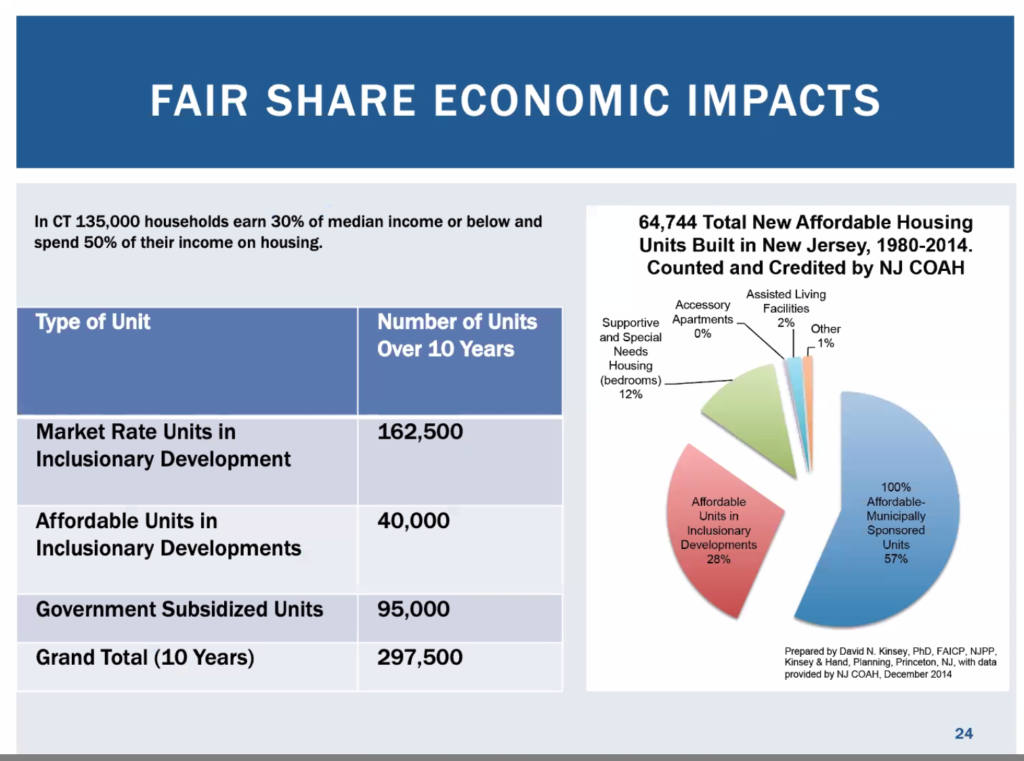|
Today, as we celebrate our collective efforts to protect the regional environment, we also reflect on one of the biggest ironies of DesegregateCT’s platform. DesegreateCT claims that Transit Oriented Development (TOD) prevents sprawl and reduces per household carbon footprint. However, zeroing in on the language of the proposed bills highlights the ways in which they are at odds with the mission of all environmental groups, namely to protect our land, air, water, and open space for generations to come.
URBANIZATION OF SUBURBS/RURAL IS BAD FOR THE ENVIRONMENT. No matter how many ways DesegregateCT tries to spin it, you simply cannot minimize carbon footprint by mandating the development of 121,000 units of housing (proposed bill HB6611), or 297,500 units of housing over 10years in Connecticut (Source: OCA Slide below). Embodied carbon emissions of building materials: concrete, iron, and steel alone produce 9% of annual global Greenhouse Gas (GHG) emissions; the construction industry accounts for 38% of total global CO2 emissions.
SB1024 and SB961 REQUIRE A DOUBLING OF CAPACITY FOR ALTERNATIVE SEWAGE TREATMENT SYSTEMS (ATS)
Environmental groups including the Connecticut League of Conservation Voters and Rivers Alliance of Connecticut have testified in opposition to ATS systems and SB961. State Agencies such as CT DEEP and CT DPH have also testified they simply do not have the resources to regulate these systems, let alone develop guidance for towns to regulate. Builders love using these systems for building of apartment complexes, but officials in both RI and MA have reported on their unacceptably high failure rates (50% within 5 years). Absent proper regulation, ATS’s are a costly environmental and public health crisis waiting to happen.
AS OF RIGHT TOD PROVISION
This provision makes the coastal towns less resilient to the rising sea levels from climate change as it proposes highly dense residential developments to center around coastline train stations along Metro North Rail and Post Road. DEEP, CT’s Environmental Protection Agency has warned against overdevelopment in low-lying, flood-prone coastal areas.
DesegregateCT continues to push for the removed As-of-Right TOD provision to be reinserted into SB1024 or the two placeholder bills. As-of-Right development is devastating to environmental protection because it removes public hearings for individual projects. Public hearing is the medium through which local P&Z Commissions hear evidence on environmental harm, such as loss of forest habitat, migratory stopovers, endangered species, greenways, and wildlife corridors. Without public hearings, a decision may be made on an application without regard to environmental harm or degradation of our resources.
The environmental intervention statute (also under attack in proposed bills), allows any person or group the right to intervene in any proceeding in order to raise environmental concerns. Green groups routinely intervene and appeal local zoning decisions in Court. When evidence of environmental impacts will not be available to a Court because it was never collected during public hearings, the Court will not be able to rule on appeals. Tying the hands of local P&Z Commissions is also tying the hands of Green groups that litigate in order to protect our precious and finite resources.
Ask yourself, will plowing over existing meadows, forests, and open space in order to erect apartment towers really be good for the environment?
|



